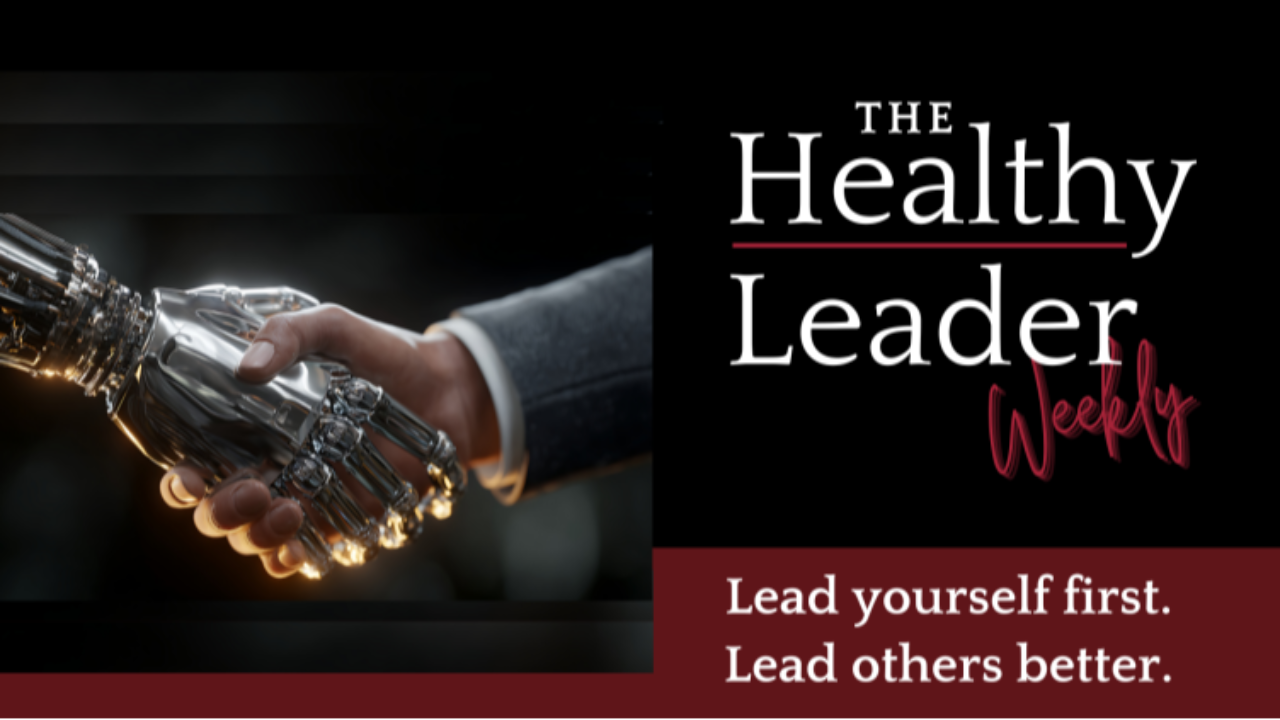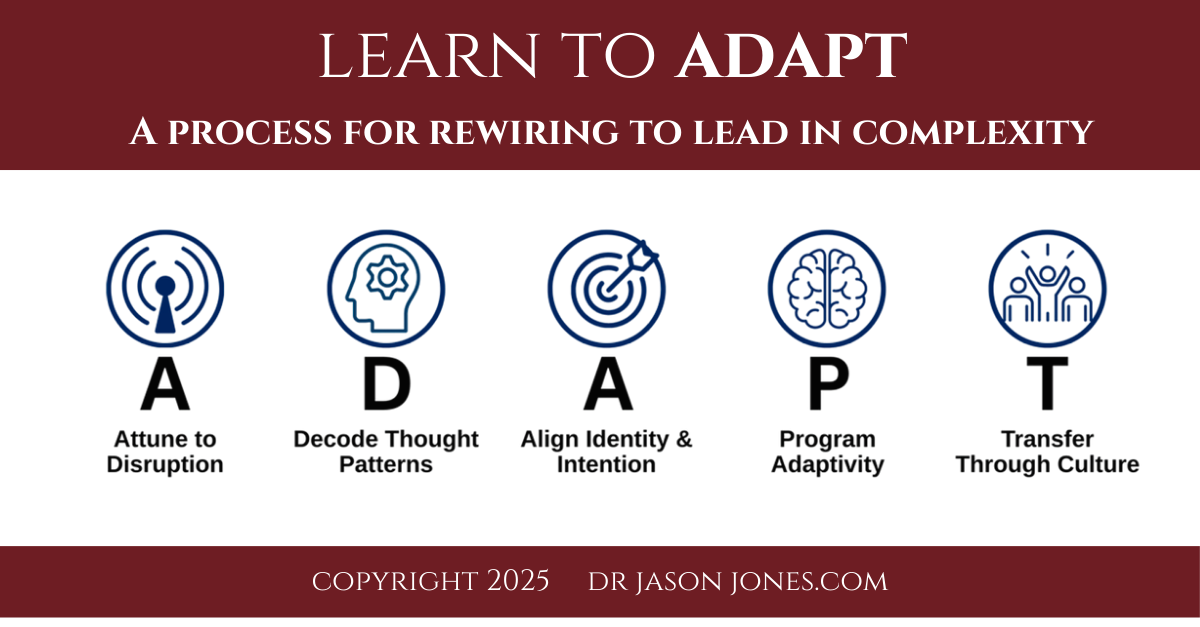The Human Advantage: Why NeuroAdaptive Leadership™ Is the Next Essential Skill
Sep 29, 2025
It's everywhere. The AI pressure pulsing through every leadership conversation, every board meeting, every strategic planning session. Are you implementing fast enough? Disrupting before being disrupted? The questions hit like alerts you can't silence. It feels like a sprint that never ends.
The questions multiply daily: Which tools should we adopt? How do we prepare our workforce? What happens to our competitive advantage if we move too slowly? Leaders find themselves caught between the urgency to transform and the impossibility of predicting which changes will matter most.
This technological arms race demands strategic attention. But while you're focused on algorithmic advancement, something more fundamental is often being overlooked.
Your human leadership capacity isn't just important in an AI-driven future; it's going to be the determining factor between organizations that thrive and those that merely survive.
Here's why: by 2027, algorithms will handle 60% of routine decision-making. Nearly half of current job skills will become obsolete within five years. As machines take over predictable functions, the premium shifts entirely to capabilities technology cannot replicate, inspiring trust, reading complex dynamics, leading through uncertainty, and creating human connection.
The leaders who win won't be those with just the best AI strategy. They'll be those who can evolve their own cognitive and emotional operating systems faster than the disruption around them.
The challenge? Our brains aren't naturally wired for this kind of relentless adaptation.
Dr. Jason Jones ,(who you can meet live at The Healthy Leader Expert Forum on Tuesday, Sept 30th) pioneer of NeuroAdaptive Leadership™, identifies the core problem: "Cognitive rigidity—the inability to flex and adapt thinking when faced with new information—is one of the greatest liabilities a leader can have."

Dr. Jason Jones
The Cost of Rigidity
Our brains aren't naturally wired for disruption. When uncertainty strikes, the brain's threat system activates. The prefrontal cortex, responsible for reasoning and decision-making, goes offline. The amygdala takes over, driving fight-or-flight responses.
Creativity drops. Focus narrows. Fear-driven decisions become the norm.
This creates cognitive rigidity at precisely the moment when leaders need to be most adaptive. While this response served our ancestors well, it's now a liability in environments that demand constant learning and flexibility.
The workplace stress crisis has measurable costs: chronic stress affects most workers, with over one-third citing their manager as the primary source. The majority want to quit their jobs, and most who leave blame poor leadership. The financial toll reaches into the hundreds of billions annually through healthcare costs and lost productivity. The human toll includes over 100,000 stress-related deaths each year.
The financial toll reaches into the hundreds of billions annually through healthcare costs and lost productivity. The human toll includes over 100,000 stress-related deaths each year.
Leaders have disproportionate influence over whether teams spiral or stabilize. They shape stress, safety, and motivation through every interaction.
NeuroAdaptive Leadership™: A Brain-Based Framework by Dr. Jason Jones
Developed by Dr. Jason Jones , NeuroAdaptive Leadership™ is a science-based system designed to help leaders retrain their brains for adaptability under pressure. It strengthens the cognitive, emotional, and behavioral patterns that determine how leaders show up when it matters most.
This isn’t about personality. These are trainable capacities powered by the brain’s ability to rewire itself through neuroplasticity.
The most valuable leaders aren’t the ones who know the most. They’re the ones who can rewire the fastest.
Through NeuroAdaptive Leadership™, leaders develop five key capacities:
- Stay calm and clear under pressure
- Navigate emotional volatility with precision
- Turn setbacks into strategic opportunities
- Translate complexity into focused action
- Build trust across virtual and hybrid teams
These capabilities are trainable. With consistent practice, they become your default response under pressure.
⭐️Join us live on September 30th for The Healthy Leader Expert Forum with Dr. Jason Jones to learn how to apply these exact tools in your life and leadership.
Register Here. ⭐️
The A.D.A.P.T Model
At the heart of NeuroAdaptive Leadership™ is the A.D.A.P.T. Model—a five-part system created by Dr. Jason Jones, organizational psychologist and executive coach, after more than two decades of research, leadership training, and coaching leaders across Fortune 500 companies.
Rooted in applied neuroscience and practical behavioral science, the A.D.A.P.T. Model helps leaders recognize and rewire unhelpful mental patterns, build real-time resilience, and lead with greater clarity, agility, and emotional precision in high-stakes environments.
It’s not theory, it’s a trainable, brain-based system for evolving how you lead under pressure.

The ADAPT Model by Dr. Jason Jones
Here’s how it works:
A – Attune to Disruption Notice change early and respond with emotional agility rather than reactivity. This strengthens resilience and executive function under stress.
D – Decode Thought Patterns Recognize and reframe limiting beliefs and biases through cognitive reappraisal, activating more flexible, rational decision-making.
A – Align Identity and Intention Lead from purpose and values, aligning motivation and consistency across decisions.
P – Program Adaptability Reinforce new behaviors until they become automatic through repetition and reward-based reinforcement that rewires the brain.
T – Transfer Through Culture Shape an adaptive culture by modeling adaptability and creating psychological safety for your team.
Start building adaptability today
You don’t need a neuroscience degree to begin practicing NeuroAdaptive Leadership™.
Here are three strategies, aligned with Dr. Jason Jones’s A.D.A.P.T. Model, that you can start using right away:
➡️ Scan your environment daily for disruption. Instead of avoiding change, get curious about it. Notice small shifts before they become major challenges.
➡️ Pause before you react. When triggered, take three deep breaths. This re-engages your prefrontal cortex and gives you space to choose your response.
➡️ Practice perspective-switching. When stuck, consciously adopt another viewpoint. Ask: "How would a customer, competitor, or team member see this?" This builds cognitive flexibility.
Your Human Edge in the AI Era
Disruption isn’t slowing down, and AI isn’t waiting for you to catch up.
But your greatest advantage as a leader won’t come from mastering the next tool. It will come from mastering yourself.
When you train your brain to become more adaptive you can experience:
- Less internal turbulence throughout your day
- Clearer thinking under pressure instead of fear-based reactions
- Stronger team trust because calm is contagious
- More energy for what matters most
These aren’t “soft skills.” They’re survival skills. And they’re trainable.
AI can assist decisions, but it can’t build trust, regulate emotions, or lead people through uncertainty with grounded presence.
That’s your edge. If you’re willing to develop it.
NeuroAdaptive Leadership™ gives you the tools to do just that, not by adding more pressure, but by working with how your brain actually functions under stress and complexity.
In a world that’s only getting faster, your ability to stay steady, think clearly, listen fully, and respond with intention is what people will remember.
This is the work of Being a Healthy Leader™, not perfect, but present.
Clear. Aligned. Human.
The kind of leader others trust—because they can feel you’re leading from the inside out.
✳️ Ready to Apply It?
Join Dr. Jason Jones, creator of the NeuroAdaptive Leadership™ system, at this month’s Healthy Leader Expert Forum.
You’ll walk away with real tools, real neuroscience, and a real framework for rewiring how you lead that you can use immediately.
🗓 Tuesday, September 30th 🕧 12:30 PM ET 📍 Register now: thehealthyleadergroup.com/expertforum Tuesday, September 30th • 12:30pm ET Register: thehealthyleadergroup.com/expertforum

Traci Fisher is the CEO of The Healthy Leader Group and creator of the Healthy Leader Operating System™. She helps leaders grow personally and professionally by aligning self-leadership with team performance.
Her work equips leaders to think more critically, make better decisions, and create solutions that fit their unique challenges. The result is healthier leaders, stronger cultures, and better results.
